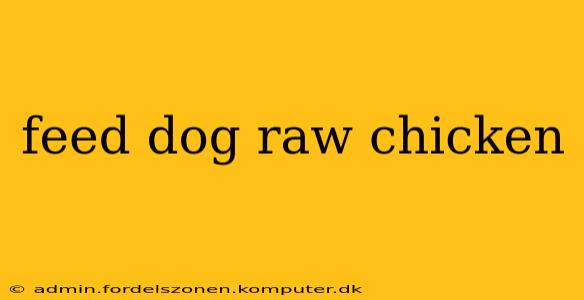Feeding your dog a raw diet, including raw chicken, is a growing trend among pet owners. However, it's crucial to understand the potential benefits, risks, and best practices before incorporating raw chicken into your dog's meals. This guide will walk you through everything you need to know to ensure your canine companion receives safe and nutritious raw chicken feedings.
Is it Safe to Feed Dogs Raw Chicken?
This is the most important question. While raw chicken can be a good source of protein for dogs, it carries significant risks. The primary concern is Salmonella and Campylobacter bacteria, which can cause food poisoning in both dogs and humans. These bacteria can contaminate raw chicken, and even meticulous handling can't guarantee complete elimination of the risk. Therefore, feeding raw chicken to dogs should be done with extreme caution and only after careful consideration of the potential dangers.
What are the Benefits of Feeding Dogs Raw Chicken?
Proponents of raw feeding argue that raw chicken provides several benefits. These include:
- High-quality protein: Raw chicken is a great source of protein, essential for muscle building and overall health.
- Natural nutrients: Raw chicken contains naturally occurring enzymes and nutrients that may be lost during the cooking process.
- Improved digestion (potentially): Some owners report improved digestion in their dogs on raw diets, though scientific evidence is limited.
Important Note: These potential benefits are often debated within the veterinary community. Many vets advise against raw feeding due to the inherent risks.
How to Safely Feed Raw Chicken to Your Dog (If You Choose To)
If, after weighing the risks, you decide to feed your dog raw chicken, prioritize safety meticulously:
- Source your chicken carefully: Purchase chicken from reputable sources known for high food safety standards.
- Thorough cleaning: Wash your hands, utensils, and preparation surfaces thoroughly before and after handling raw chicken.
- Separate preparation areas: Avoid preparing raw chicken on the same surfaces you use for preparing human food.
- Freezing: Consider freezing the raw chicken for several days to reduce the bacterial load. This is not a guarantee of eliminating all bacteria but can help minimize risk.
- Monitor your dog closely: Watch for any signs of illness, such as vomiting, diarrhea, or lethargy, after feeding raw chicken. Contact your veterinarian immediately if you observe any concerning symptoms.
- Consult your vet: Before starting any raw food diet for your dog, including one with raw chicken, consult with your veterinarian. They can assess your dog's individual needs and health status to determine if a raw diet is appropriate.
Can Raw Chicken Cause Illness in Dogs?
Yes, raw chicken can cause illness in dogs due to bacterial contamination. Salmonella and Campylobacter are the most significant concerns. Symptoms of food poisoning in dogs can include:
- Vomiting
- Diarrhea (often bloody)
- Lethargy
- Loss of appetite
- Fever
These symptoms can range from mild to severe, and in some cases, can be life-threatening.
What are the Alternatives to Raw Chicken for Dogs?
Many healthy and safe alternatives to raw chicken exist for providing your dog with protein:
- Cooked chicken: Cooked chicken is a safer alternative and still provides a good source of protein.
- Other lean protein sources: Consider options like cooked turkey, beef, lamb, or fish.
- Commercial dog food: High-quality commercial dog food is formulated to meet your dog's nutritional needs.
Conclusion
The decision to feed your dog raw chicken is a personal one. However, it is vital to understand the inherent risks and take every precaution to minimize the chances of bacterial contamination. Always prioritize your dog's safety and consult your veterinarian before making significant changes to their diet. While some believe raw chicken offers benefits, the potential for serious illness makes careful consideration and responsible preparation absolutely essential. Remember, the health and wellbeing of your dog should always come first.
